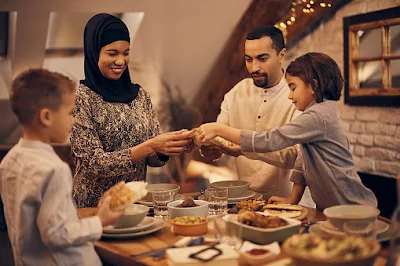Ajang Berita - Ramadhan traditions: exploring the rich cultural practices of the holy month. These traditions provide Muslims with a sense of community, identity, and purpose, and they serve as a reminder of the values and principles that are central to Islam.
Ramadhan Traditions: Exploring the Rich Cultural Practices of the Holy Month
Ramadhan is a holy month for Muslims around the world. It is a time for spiritual reflection, prayer, and fasting.
 |
| Ramadhan traditions: exploring the rich cultural practices of the holy month |
During this month, Muslims observe various cultural traditions that have been passed down through generations.
In this article, we will explore some of the rich cultural practices of Ramadhan and how they bring Muslims closer to their faith.
Suhoor and Iftar:
Suhoor and Iftar are two of the most important traditions of Ramadhan.
Suhoor is the pre-dawn meal that Muslims consume before the start of the fast. It provides the necessary energy and nutrients to get through the day.
Iftar, on the other hand, is the meal that Muslims consume after sunset to break their fast. These meals are often enjoyed with family and friends and can include traditional dishes that vary from region to region.
Tarawih Prayers:
Tarawih prayers are special evening prayers that are performed during Ramadhan. These prayers are offered after Isha prayer and can last up to two hours.
They consist of 20 rakats and are recited in groups. Tarawih prayers provide a unique opportunity for Muslims to come together and worship in congregation.
Zakat:
Zakat is one of the Five Pillars of Islam and involves giving a portion of one's wealth to those in need.
Many Muslims choose to give Zakat during Ramadhan as it is a time of heightened spiritual awareness and generosity.
Zakat can be given to individuals, charities, or organizations that support those in need.
Eid al-Fitr:
Eid al-Fitr is a three-day festival that marks the end of Ramadhan. It is a time of celebration and feasting, and many Muslims choose to wear new clothes and give gifts to family and friends.
Eid al-Fitr is a time for forgiveness, reconciliation, and strengthening bonds with loved ones.
Quranic Recitation:
Ramadhan is also a time for Muslims to deepen their connection to the Quran. Many Muslims choose to recite the entire Quran during Ramadhan, either individually or in groups.
Reciting the Quran is considered a powerful act of worship that brings blessings and spiritual purification.
Community Service:
Many Muslims choose to engage in community service during Ramadhan. This can include volunteering at a soup kitchen, organizing a food drive, or participating in a charity walk.
Community service is seen as a way to give back to the community and demonstrate the values of compassion and kindness that are central to Islam.
In conclusion, the cultural traditions of Ramadhan reflect the diverse and rich heritage of the Muslim community.
From sharing meals with loved ones to engaging in acts of charity and worship, Ramadhan is a time of deep spiritual reflection and connection to one's faith.
These traditions provide Muslims with a sense of community, identity, and purpose, and they serve as a reminder of the values and principles that are central to Islam.
As Muslims around the world observe Ramadhan, let us celebrate the richness of our cultural traditions and strive to live our lives in a way that reflects the spirit of this holy month.

